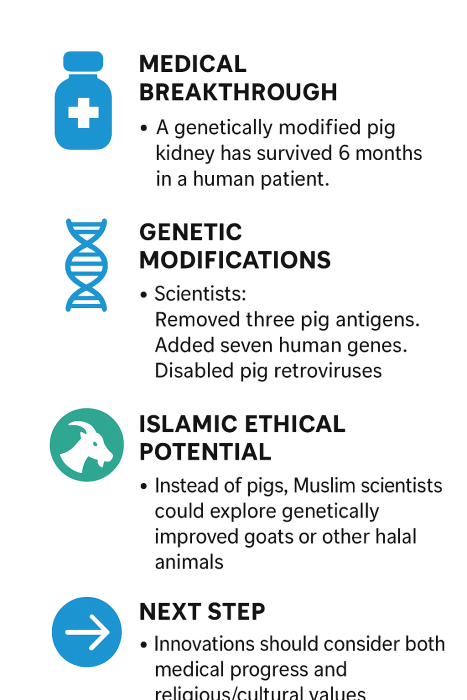Exploring Halal Alternatives to Pig Organs - Can Muslim Scientists Lead the Way in Halal Genetic Innovations?
Posted 4 months ago
Executive Summary
A recent medical milestone reported in Nature shows that a genetically modified pig kidney has successfully functioned in a human patient for six months, marking the longest survival of such an organ. Scientists achieved this by removing pig antigens, adding human genes, and disabling pig retroviruses, significantly reducing risks of rejection and infection.
While this breakthrough offers hope in addressing the global shortage of human organs, it also raises cultural and religious considerations. For Muslims, pigs are not halal, making pig-based medical solutions ethically sensitive. This opens a new avenue for Muslim scientists to explore alternatives, such as genetically modified goats or other halal animals, which would align with both medical needs and Islamic ethical principles.
The case highlights not only the promise of xenotransplantation but also the importance of engaging Muslim researchers in creating innovations that respect faith, ethics, and global health priorities.
The prestigious scientific journal Nature reported that a 67-year-old man in the U.S., Tim Andrews, received a kidney transplant from a genetically modified pig. Six months later, the organ is still functioning well, allowing him to stop dialysis. This marks the longest survival of a pig organ in a living person, a significant milestone in the field of xenotransplantation (animal-to-human organ transplants).
Why is this so important?
The first six months after a transplant are the riskiest. Risks like anemia or the body rejecting the organ are highest then. Reaching the six-month milestone signifies that the procedure is moving in the right direction.
How was the pig kidney genetically modified to match human body?
Scientists made three key genetic changes to the pig’s kidney:
1. Removed three pig antigens that typically trigger human immune rejection.
2. Seven human genes were added to reduce inflammation and prevent bleeding.
3. Inactivated pig retroviruses (which are viral elements hidden in pig DNA) so they can’t cause infections.
What's next?
The researchers say twelve months would be another impressive benchmark proving xenotransplantation's long-term viability.
A Thought for Muslim Scientists
While this breakthrough focuses on saving human lives, there's another fascinating angle to explore: could genetically engineered animals like goats be developed to meet halal dietary standards? Muslims universally accept goats as halal, unlike pigs, which are strictly forbidden. This opens up a world of possibilities for halal animal engineering.
Islamic scholars generally require that food be “halalan tayyiban”—permissible and wholesome. Genetic modifications must preserve safety, purity, and respect for God’s creation. This brings to the forefront the ethical and religious considerations in GMOs, sparking a thoughtful discussion among Muslim scientists.
• There is no outright ban on GMOs in Islam. Many Muslim authorities and institutions (like Indonesia’s MUI and Malaysia’s JAKIM) have found GM foods acceptable as long as they are from halal sources and safe to consume.
So, if scientists can genetically engineer goats (or other halal animals) to enhance desirable trait-like disease resistance, transplantation ready while maintaining ethical and religious integrity, this could open new doors for healthcare among Muslims also.
Why This Matters?
Medically, this pig-to-human transplant is a groundbreaking step toward addressing the global shortage of human organs. This not only offers hope for patients in need but also paves the way for a brighter future in medicine and for Muslim communities to explore Halal alternative using the same technology.
• Ethically and culturally, it invites broader conversations. For Muslim scientists, it presents an opportunity to innovate in harmony with faith and medical innovation. This could lead to the design of genetically modified animals that are both technologically advanced and religiously appropriate.
In simple terms: this news is not only an exciting medical milestone, it also offers a fresh perspective for Muslim researchers to explore genetic science in ways that respect Islamic dietary laws and ethical values. Let me know if you'd like to explore halal bioethics more or how such innovations might be discussed in Islamic scholarship.
Disclaimer
The contents provided on www.biomedglobal.org are intended for general informational and educational purposes only. This website's information, articles, and resources are based on data and findings from scientific publications, publicly available research, and reputable sources.
While every effort is made to ensure accuracy and reliability, Biomed Global does not guarantee, endorse, or assume responsibility for the information's completeness, timeliness, or validity.
The material on this website should not be considered a substitute for professional advice, diagnosis, or treatment. Users are strongly encouraged to consult qualified healthcare professionals, researchers, or subject-matter experts before making decisions based on the information presented here.
Under no circumstances shall Biomed Global, its affiliates, contributors, or authors be held liable for any direct, indirect, incidental, or consequential damages arising from the use of, or reliance on, the content of this website.
By accessing and using www.biomedglobal.org you fully acknowledge and agree to this disclaimer.





